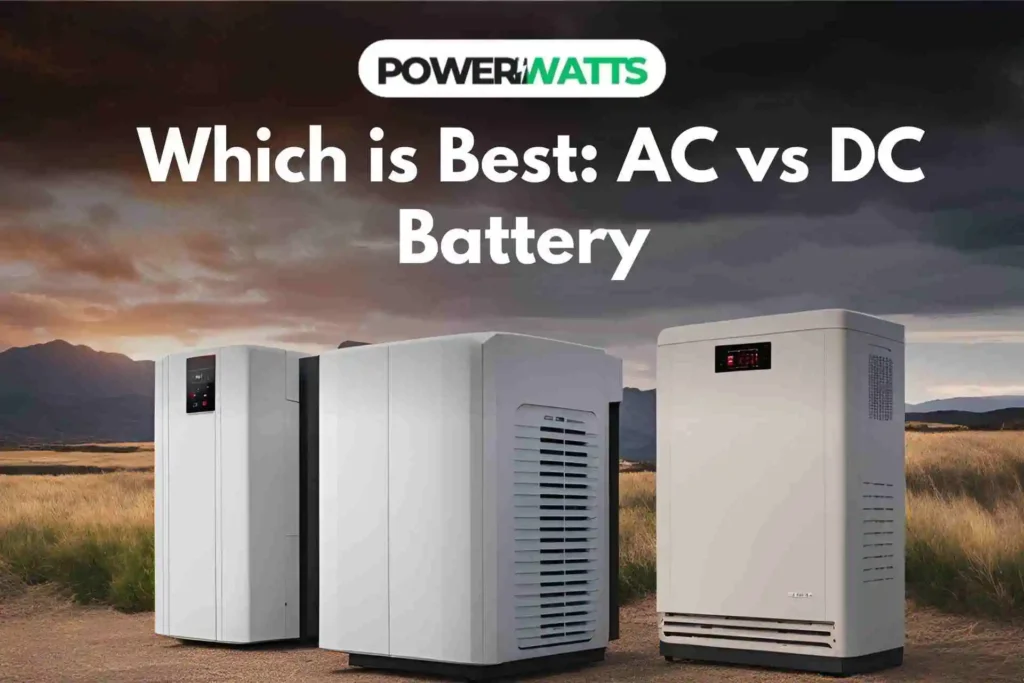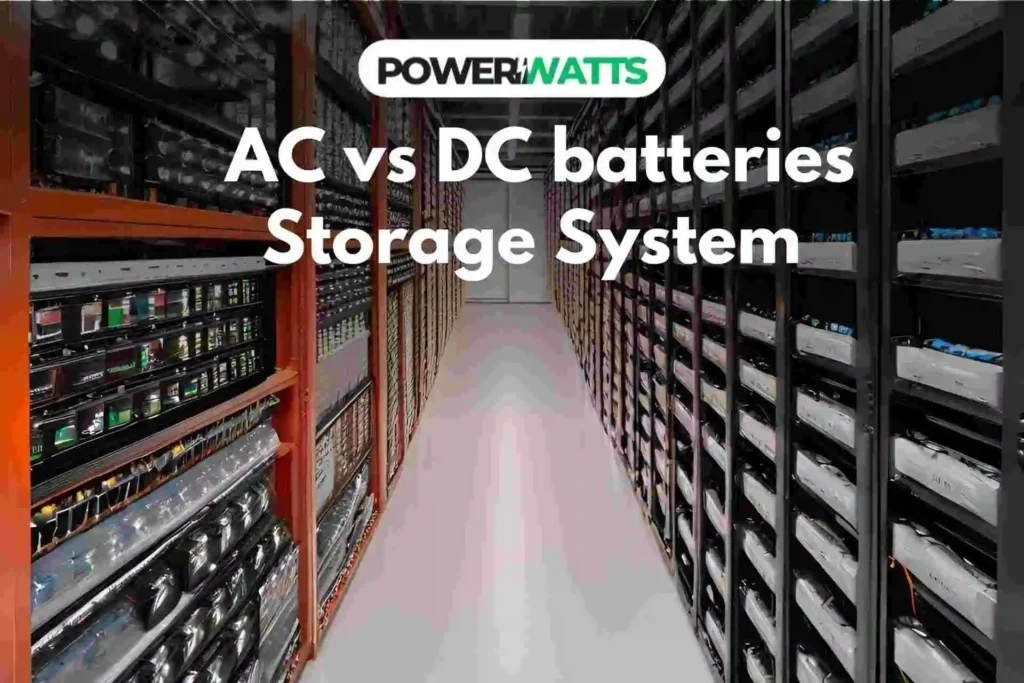Are you thinking about adding batteries to your solar system at home? I am sure You are not alone. A lot of people who own solar panels want to store the extra energy they make so they can use it later. But, which is better: an AC battery system or a DC battery system?
This choice is important. This blog post will explain the differences between storing power in AC vs DC batteries storage. We will talk about the pros and cons of each battery and help you figure out which works best for your home. You will have a better idea of which battery storage system will work best for you and save you money on your energy bills by the end. So, read and find the best answer for your home.
Understanding AC and DC Electricity
Before discussing battery storage, we must understand AC and DC power. Knowing this will assist you choose your home’s energy configuration.
Direct Current (DC) electricity flows in one direction. Solar panels create DC power from sunshine. Battery storage stores DC energy for usage when the sun isn’t shining. Most domestic equipment requires AC, thus DC power must be converted to AC before use.
Alternating Current (AC) electricity alternates direction sporadically. This is the normal electricity in homes and businesses. Power plants provide AC energy to households and businesses via the grid.
AC- Coupled Battery Storage:
Batteries that are linked to your home’s current AC grid. Two different transformers are usually needed for this setup: one for the solar panels and one for the batteries.
Pros of AC-Coupled Battery
- I am sure AC battery systems are great for homes that already have solar panels and want to add battery backup. The startup process is simple and doesn’t require many changes to the current setup.
- Efficient use of money: Most of the time, these systems have lower start-up costs because they don’t need a hybrid generator to be replaced. A lot of homes choose AC-coupled systems because of this.
- High Load Management: AC-coupled systems are great for running large AC loads during the day because they can get power straight from the sun without sending it to the battery first.
Cons of AC-Coupled Battery
- Less efficient: Most AC-coupled systems are between 90% and 94% efficient because energy is changed from DC to AC and back to DC several times while it is being stored and used.
- Complexity: Having two inverters can make the system more complicated, which could mean that more parts could fail.
- Putting away DC-coupled batteries
DC-Coupled Battery Storage
In a DC-coupled system, the batteries and solar panels are linked by a single transformer. This lets the DC energy that the panels make flow straight into the batteries to be stored.
Pros of DC-coupled Battery System
- More efficiency: Up to 98% of the time, DC-coupled systems are very efficient. There are fewer losses than in AC systems because the energy is only changed once, from DC to AC.
- How Cost-Effective New Installations Are: DC-coupled options are often cheaper for homes that are putting in a new solar and battery system because they need fewer parts. This could mean lower installation costs all around.
- Oversizing: With DC-coupled systems, you can make the solar panels bigger than the transformer can handle. This means that extra energy can be used to charge batteries or power other devices which makes the best use of energy.
Cons of DC-Coupled Battery Systems:
- The generator in a DC-coupled system has to be close to the battery, which can make placement choices limited.
- There is only one transformer, so if it breaks, both the solar panels and the batteries won’t work, which could cause downtime.

Which is Best: AC vs DC Battery Storage System
Picking between AC vs DC batteries storage rests on several things, such as
Infrastructure Already In Place:
If you already have a solar system, you might be able to add an AC-coupled battery more easily. On the other hand, if you are starting from scratch a DC-coupled system might be more cost-effective and work better.
Energy Needs:
Think about how much energy your home usually uses. If you use a lot of energy during the day, an AC-coupled system might work better for you.
Budget:
Figure out how much each method will cost. For retrofits, AC-coupled systems may be cheaper upfront, but in the long run, DC-coupled systems may be cheaper for new installs.
Key Factors When Choosing between AC and DC Battery Storage
Numerous considerations should influence your choice between AC vs DC batteries storage. First, assess your solar system. Retrofitting AC-coupled batteries to a solar system is simpler and cheaper. They need two inverters—one for the solar panels and one for the battery—for installation flexibility without a system redesign
However, DC-coupled batteries may be superior for new solar installations. Single-inverter systems are more efficient and cheaper owing to fewer components. I am sure it maximizes energy storage and utilization by integrating smoothly with solar systems.
Another factor is efficiency. DC-coupled systems use one DC-to-AC conversion, reducing energy loss and improving efficiency. However, ac systems need repeated conversions and reduced efficiency.
At last, consider energy and budget. Consider how frequently you’ll use the battery and whether you need backup power during outages. Consider these variables to make a selection that fits your energy objectives and budget. And if you need customized help then Get A Quote. Our team will help you.
We are suggest you to also read for better understanding
Do Batteries Store AC or DC Power?
DC electricity is stored in batteries. This makes power flow in one direction, suitable for storage. Solar panels convert sunlight into DC power which is stored in batteries. However, most domestic equipment utilizes AC power, which flows back and forth. Battery energy must be transferred from DC to AC for household usage.
When you install a solar battery, the panels charge it with DC electricity. This is necessary since batteries cannot hold AC power. A battery connected directly to an AC source will not charge effectively since AC flows in and out, preventing net charging. Homeowners who want to optimize their energy systems and use battery storage must understand this differential.
Conclusion
I am sure you understand which battery storage system is best for you. Each method has pros and cons, therefore the best one depends on your scenario. Retrofitting a solar system with AC-coupled batteries is easy and affordable. Their ease of installation and integration with your system lets you save energy expenditures immediately. In contrast, a DC-coupled battery may be preferable for a fresh solar system.
However, these differences are important because solar energy demands are high. And if you want a solar system in your home then you must choice the best battery system. However, Investing in a solar battery system, whether AC or DC, increases energy independence and sustainability.
Get a Quote from our solar experts to examine your choices and discover the best solution for your house. We will provide customized guidance and guide you through your options.


